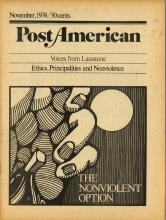It’s good to be part of an exploration of nonviolence in a magazine whose roots are sunk in evangelical Protestantism. It’s good because, as often been remarked in these pages, American evangelicals have for too long acquiesced in a near total identification with a national status quo which has produced about as much violence as one could imagine. But it’s even better because the proponents of nonviolence, particularly those of my generation—the veterans of the sixties—have a good deal to learn from their evangelical sisters and brothers. It is the latter that I want to reflect on here, since in the long run I think this is probably the more important of the two; the evangelicals can doubtless survive without adopting nonviolence, but I’m not sure nonviolence will make it as a meaningful social force without hearing what evangelicalism has to tell it.
Two points in the evangelical tradition seem to me to be of special relevance for the nonviolent activists of the seventies, and they are: first, the emphasis on high standards of personal morality as the base of social change and betterment; and second, the insistence on the reality of the ‘principalities and powers’ standing behind and above visible institutions.
Read the Full Article

